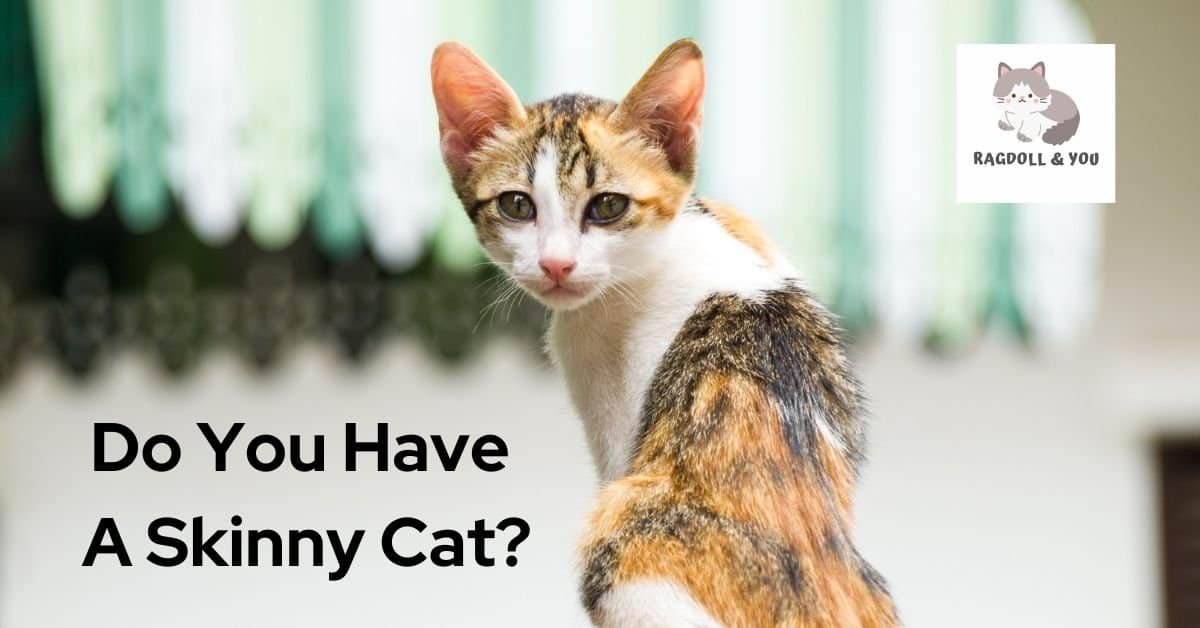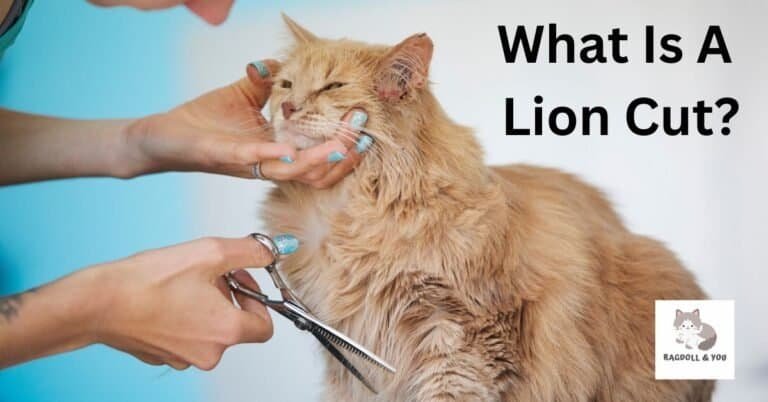Do You Have A Skinny Cat? Here Are The Causes & Solutions
Determining whether your breed of cat is too skinny can be challenging without assistance. Fortunately, the Body Condition Score Chart and Hand Tests come to the rescue of cat lovers.
A skinny cat does not always mean unhealthy. Weighing a cat at home may not be the best method to reach any conclusion. Underlying causes like diabetes, cancer, stress, anxiety level, etc., may result in sudden weight loss in cats. It is best to consult a professional to determine the right cause and plan treatment.
Keep reading to learn how to identify a skinny cat, possible weight loss causes, and ways to help them manage it.

Key Takeaways
- Cat Body Condition Scores or simple hand tests can determine whether your cat is underweight.
- Potential weight loss causes include insufficient food, diabetes, cancer, kidney disease, hyperthyroid disease, and gastrointestinal disorders.
- If your cat is too skinny, visit the vet for a check-up.
- Consider smaller meals throughout the day and talk to your vet about supplements or nutrition gels.
How To Tell If Your Cat Is Underweight?
Use the Cat Body Condition Score or perform a simple hand test to determine if your cat is underweight.
Cat Body Condition Score
A Cat Body Condition Score (BCS) tells if a cat has a normal weight. The scale can go to 5 or 9 points. If your cat scores a 3 out of 5, it has an ideal weight.
But on a nine-point scale, that’s thin! IAMS teaches how to use this score and pick the right type of food for your cat’s needs. You can also get a free guide that shows if your cat is too skinny.
It also offers tips on how to help it eat more.
Hand Test
Use the hand test to see if your cat breed is too skinny. Just run your hand gently over the side of your cat. If you can feel their ribs and backbone, it means they are underweight.
There should only be a slight layer of fat on top. This way, you don’t need a scale to check a cat’s drop in weight. The hand test gives good details fast.
Healthy Weight Ranges for Your Cat
Understanding the healthy cat weight range ensures they stay in their best health. The range can vary depending on breed, sex, and age. Here are the typical weight ranges for cats:
| Cat Type | Weight Range (lbs) |
| Average Domestic Cat | 8-12 |
| Male Domestic Cat | 11-15 |
| Female Domestic Cat | 8-12 |
| Female Siamese Cat | Up to 15 (considered overweight) |
| Cat with a Score of 5 | Approximately 10 (healthy) |
Causes of Cat Weight Loss
Several potential causes for cat weight loss include diabetes, insufficient food intake, cancer, feline infectious peritonitis, and age-related issues.
Kidney disease, hyperthyroidism, intestinal parasites, mental health problems, gastrointestinal problems, toothache, arthritis, failing senses, and skinny old cat syndrome (SOCS) are others.
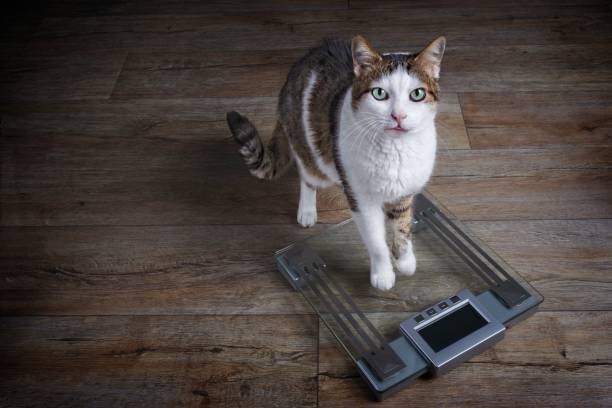
1. Diabetes
Diabetes in cats can cause extra weight loss, even with more access to food. It happens because the cat’s body can’t properly use insulin to regulate blood sugar levels.
Common signs of diabetes in cats include excessive thirst, frequent urination, and diabetes weight loss. Contact the vet for diagnosis and treatment if your cat shows these common symptoms.
High blood sugar levels can be dangerous for cat breeds with diabetes. Proper management is crucial to their health and well-being.
2. Not Enough Food
Not having enough food is a common reason cats lose weight. When cats don’t get enough food, they may become underweight or skinny.
Ensure your cat receives nutritious food to prevent malnutrition and low energy levels. Causes for insufficiency include improper feeding schedule, portion control issues, or loss of appetite.
Suppose your cat is losing weight and suspect it’s due to insufficient food. In that case, adjust their feeding routine and ensure they have a healthy appetite.
3. Cancer
Cancer is a common reason behind weight loss in older breeds of cats. It can occur anywhere in their body and cause them to become skinny. Many different cancers can lead to weight loss in cats.
The diagnosis and treatment plan will depend on the specific kind and stage of cancer. Even though they may be losing weight, cats with cancer might still have a normal appetite.
Cat owners must be aware of sudden changes in their body weight or eating habits. They must seek veterinary care promptly if needed.
4. Feline Infectious Peritonitis
Feline infectious peritonitis (FIP) is a highly contagious virus that affects cats. It can have wet and dry forms, each with additional symptoms and effects.
FIP is challenging to diagnose accurately because it can mimic other cat diseases. This disease in cats can lead to complications like uveitis and eye disease and can be fatal.
5. Age
As cats age, they are more prone to average cat weight loss. This can be due to chronic renal disease, diabetes mellitus, hyperthyroidism, and cognitive dysfunction syndrome.
These medical conditions can cause behavioral changes in older cats and lead to weight loss. Provide proper nutrition for senior cats to address any diet-related weight loss issues.
6. Kidney Disease
Kidney disease is a common health problem in cats. Infections, poisons, or other factors can cause it. One of the signs of kidney disease in cats can be weight loss.
Cats with chronic kidney disease may also have protein loss in their urine and a poor appetite. Another symptom to watch out for is deterioration of the back legs.
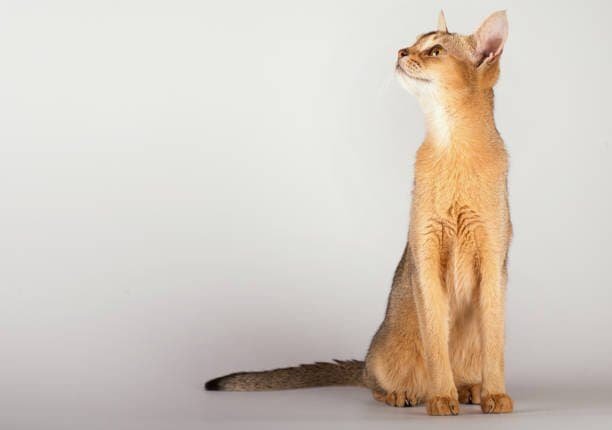
7. Hyperthyroidism
Cats with hyperthyroidism may become skinny. The thyroid gland has an overactive thyroid hormone, which speeds up the metabolic rate.
This means that even though they eat a lot, they still lose weight. More than 75% of cats with a sign of hyperthyroidism experience muscle wasting. Another symptom is a rapid heartbeat.
Fortunately, FDA-approved medication is available to treat this condition.
8. Intestinal Parasites
Intestinal parasites are common in cats and can cause extra weight loss. These parasites, like worms, live in the intestines and lead to the absorption of nutrients from the cat’s body.
The cat may experience unintentional weight loss, diarrhea, bloating, and vomiting. Pregnant mothers can also pass these parasites to their kittens.
Treating intestinal parasites promptly prevents further complications and ensures your cat stays healthy.
9. Mental Health
Cats, like humans, can experience mental health challenges. A cat may experience stress or feel anxious, which leads to weight loss. Some signs of mental health problems in cats include changes in behavior like loss of appetite or excessive grooming.
These issues can be triggered by environmental changes or trauma. To improve your cat’s mental health, provide a stable and enriching environment that helps them feel safe and secure.
10. Gastrointestinal Problems (GI)
A Gastrointestinal issue can cause cat weight loss. It is a medical issue that affects digestive function and causes problems like inflammatory bowel disease, food allergies, and certain infections.
Cats with Gastrointestinal tract problems may experience lethargy, depression, appetite loss, vomiting, and abdominal discomfort.
11. Toothache
Toothache in cats can cause weight loss because it makes them not want to eat. Cats with dental issues may also drool and paw at their mouths. Dental disease or toothache in cats can be painful. Tooth pain can lead to inflammation, which makes it even harder for cats to eat.
If your cat has chronic dental pain, they might eat less or stop eating altogether. Regular checkups by a veterinarian prevent toothaches and help with enhanced dental health.
12. Arthritis
Arthritis affects cats and contributes to weight loss in skinny cats. It causes inflammation in the joints, making it painful for them to move around and eat properly.
This pain can lead to decreased appetite, resulting in weight loss. Arthritis commonly affects a cat’s hindquarters, making it difficult to walk or jump.
Managing arthritis in cats helps with their weight and improves their overall quality of life. There are home remedies available that can help alleviate the pain and stiffness.
13. Failing Sense of Smell
A failing sense of smell can cause weight loss, especially in older cats. As cats age, their sense of smell may decrease, leading to a lack of appetite and finicky eating habits. This can contribute to weight loss and the development of “skinny old cat syndrome” (SOCS). Upper respiratory infections cause nasal congestion, affecting a cat’s ability to smell and taste food.
Monitor your cat’s eating habits and consult a veterinarian if you suspect a failing sense of smell.
14. Skinny Old Cat Syndrome (SOCS)
Skinny old cat syndrome (SOCS) is a common issue affecting older cats and causes them to lose weight. It is often seen in cats that eat high-protein diets.
Another contributing factor to weight loss in older cats is inflammatory bowel movements. As cats age, their ability to absorb fat and protein decreases. Consulting with a veterinarian may be worthwhile if you notice your senior cat losing weight.
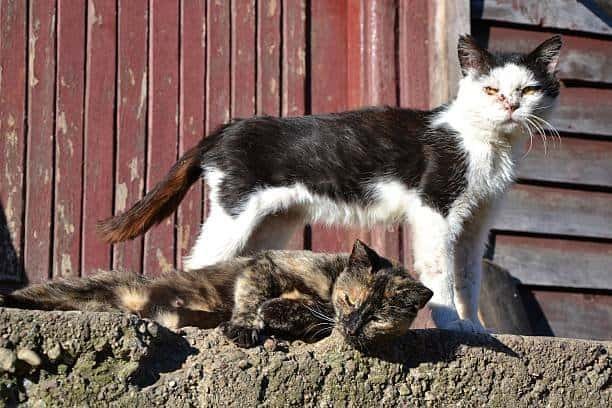
What to Do if Your Cat is Too Skinny
If your cat is too skinny, here are some steps you can take:
- Take your cat to the vet to rule out any underlying health issue.
- Ensure your cat eats enough food and gets a healthy diet.
- If your cat is not interested in their regular food, try offering different flavors or textures.
- Consider feeding smaller, more frequent meals daily to increase calorie intake.
- Talk to your vet about supplements or high-calorie nutrition gels that promote weight gain.
- Monitor your cat’s weight regularly and adjust their feeding plan.
Why Is My Cat Hungry All the Time?
If your cat is constantly hungry, it could indicate calorie deficit, malnutrition, psychological/emotional issues, or physical illness.
Calorie Deficit
A calorie deficit is one possible cause of a cat being hungry but skinny. A calorie deficit is when a cat consumes fewer calories than it burns, causing weight loss and increased hunger.
This can happen if the cat isn’t eating enough food or has difficulty digesting fat. Signs of a calorie deficit may include weight loss, muscle loss, and excessive hunger.
Malnutrition
Malnutrition is a condition that occurs when cats don’t get enough essential nutrients from their food bowl. This can lead to various health problems.
Cats who are malnourished may have dry and scaly skin, weak muscles, and abnormal feces. They may also appear very skinny and show signs of fatigue. You can prevent malnutrition and keep your cat healthy by providing a balanced and nutritious diet.
Psychological and Emotional
Cats, like humans, can experience psychological issues and emotional factors contributing to increased hunger. Emotional stress or anxiety can lead to changes in eating habits.
When cats feel anxious or stressed, they may seek comfort by eating more frequently or consuming larger quantities of food.
This can result in weight loss if their calorie intake exceeds their energy expenditure. Understanding the emotional well-being of your cat is crucial.
You can alleviate their anxiety by identifying potential signs of stress and providing appropriate care and attention. Establish a balanced feeding routine meeting their physical and emotional needs.
Physical Illness
Physical illnesses can also contribute to a cat being hungry constantly but still losing weight. Hyperadrenocorticism, or Cushing’s disease, and cats with hyperthyroidism may experience increased appetite and weight gain. These diseases affect the hormones and metabolism of the cat, leading to constant hunger.
Feline Acromegaly
Feline acromegaly is a condition in cats caused by the excessive production of the somatotropin growth hormone. This can lead to unexplained weight loss even if the cat eats a lot.
Cat acromegaly is often linked to diabetes and difficulty maintaining healthy blood glucose levels. Cats with this condition may also show symptoms like a dull coat, restlessness, aggressive behavior, and body shape changes. It is usually caused by tumors in the anterior pituitary gland.
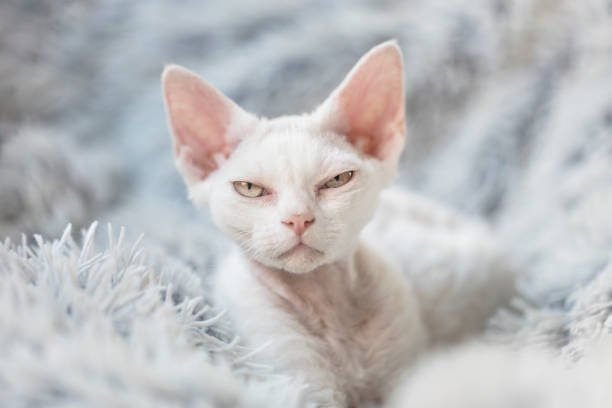
Calorie Requirements & Feeding Schedule for Cats
Cats require a specific amount of calories per day based on weight, activity level, and age. These requirements should be adjusted accordingly to ensure your feline companions stay healthy.
Use the following table to guide calorie requirements and feeding schedules.
| Age/Condition | Calorie Needs | Feeding Schedule |
| Adult Cat (normal activity) | 20-33 calories per pound | Feeding should be done twice a day |
| Adult Cat (weight issues) | 130–150 kcal/day | Portion-controlled feeding throughout the day |
| Kitten (0–6 months) | 60–65 calories per pound | Three meals a day |
| Kitten (6–12 months) | 35–46 calories per pound | Two to three meals a day |
| Senior Cat | Depends on health conditions | Consult with a veterinarian |
Why Is My Cat Eating A Lot But Losing Weight?
There could be several reasons your cat is eating a lot but still losing weight. Read on to find out the potential underlying causes and how you can address them for your feline friend’s well-being.
Thyroid Issues
Thyroid issues are common in cats and can affect their weight. Hyperthyroidism, a condition where the thyroid gland produces too much hormone, is often characterized by weight loss despite increased appetite stimulants.
Cats with hyperthyroidism may also have increased thirst, urination, and changes in their coat.
On the other hand, hypothyroidism is when the thyroid gland doesn’t produce enough hormone, which can lead to weight gain and lethargy. There is an FDA-approved drug available for treating hyperthyroidism in cats.
It’s important to consult your veterinarian if you suspect any thyroid issues in your cat so they can provide proper diagnosis and treatment options.
Diabetes
Diabetes is a common cause of weight loss in cats. It happens when a cat’s body stops producing insulin or doesn’t make enough insulin. Cats with diabetes may show signs like increased thirst and urination.
Obesity increases the risk of developing diabetes in cats. If your cat has unexplained weight loss, excessive drinking, and large volumes of urine, it could be a warning sign of diabetes.
Inflammatory Bowel Disease
Inflammatory Bowel Disease (IBD) is a condition that can cause weight loss in cats. Cats with IBD may not want to eat or have a decreased appetite. This disease affects their ability to absorb nutrients, which leads to weight loss.
Some signs of IBD include vomiting, diarrhea, changes in appetite, and weight loss. It’s important to note that food allergies, infections, and IBD can contribute to weight loss in cats.
If you notice any of these symptoms in your cat, it’s best to consult with a veterinarian for proper diagnosis and treatment.
Worms
If your cat is experiencing unintentional weight loss, worms could be the culprit. These internal parasites, such as roundworms, tapeworms, and hookworms, can cause symptoms like diarrhea, bloating, and vomiting in cats.
Pregnant cats can pass these intestinal parasites to their kittens, leading to weight loss. Worm infestations prevent cats from getting energy from their meals, resulting in weight loss even if they eat a lot.
Furthermore, worm infestations can also cause constipation in cats, contributing to their weight loss. Treating these worms promptly is important to protect your cat’s health and help them regain their proper weight.
Cancer
Cancer is one of the causes of weight loss in cats. It’s not the only reason, but it can lead to sudden and rapid weight loss.
Cats with gastrointestinal (GI) cancer may experience bloating or a noticeable increase in their abdomen size. Along with weight loss, other signs of cancer in cats include appetite, behavior, and appearance changes.
So, if you notice your cat losing weight quickly and showing these symptoms, it’s essential to consult a veterinarian for proper diagnosis and treatment options.
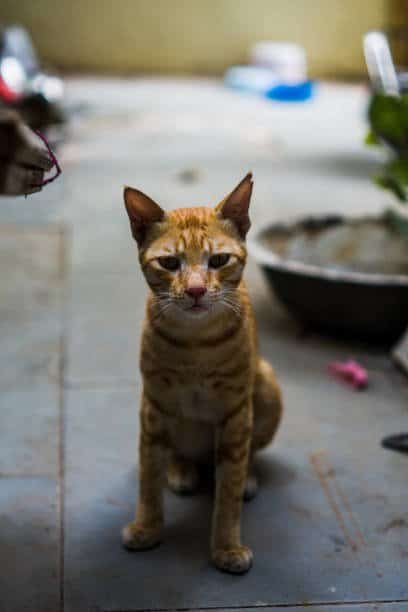
Feline Diabetes And Its Treatment
Feline diabetes is a common condition in cats that can lead to weight loss and other health issues. Treatment includes insulin therapy and dietary changes to manage blood sugar levels.
Insulin Therapy
Injectable insulin is a common and effective treatment for feline diabetes. It regulates blood sugar levels in diabetic cats by replacing or supplementing the naturally produced insulin.
Insulin therapy has shown a higher success rate in achieving glycemic control and even remission in cats with diabetes.
Veterinary Internal Medicine specialists can provide valuable information on the proper use of insulin therapy for treating feline diabetes.
Studies have evaluated different insulins, including porcine lente insulin, as options for diabetic cats. Commonly used products include protamine zinc insulin, insulin glargine, and pork Lente products.
Dietary Therapy
Dietary therapy is crucial in managing and treating various cat health conditions, including diabetes. For diabetic cats, a diet low in carbohydrates improves blood sugar regulation.
Prescription food options specifically designed for diabetic cats, which are low in carbohydrates, are available. These special diets are high in protein and low in fiber.
They resulted in a significant reduction of over 50% in blood sugar levels. These diets may be calorie-dense, leading to obesity if not controlled properly; they benefit diabetic cats.
How do you make a skinny cat gain weight?
Provide a nutritious and wholesome diet to help your skinny cat gain weight. Increase feeding proportions, supplement with a high-calorie nutrition gel, and offer dry and wet cat food.
Provide a Nutritious, Wholesome Diet
To help skinny cats gain weight, provide them with a nutritious and wholesome diet. Feed them high-quality cat food rich in animal proteins, moderate in fat, and low in carbohydrates.
Look for cat foods specifically formulated for weight gain. They must be nutritionally balanced with the right protein, fat, and calories.
You can supplement their diet with high-calorie nutrition gels or mix dry cat food and wet cat food. It will make meals more enticing.
Giving your skinny cat snacks and supplements works as appetite stimulants and encourages them to eat more.
Increase/Adjust Feeding Proportions & Amount
To help a skinny cat gain weight, increase or adjust the amount of food you give them. Gradually increasing the portions and adjusting the feeding schedule can benefit weight gain.
Consult your veterinarian to determine how much food is appropriate for your cat’s needs. Feeding a calorie-dense diet and providing nutritious, wholesome meals aids in weight gain.
Offer fresh or wet food instead of dry food to fatten a cat. Monitor their progress and make adjustments to ensure they reach a healthy weight.
Supplement with a High-Calorie Nutrition Gel
If your cat is skinny and needs to gain weight, supplement their diet with a high-calorie nutrition gel. These gels are specially formulated to be rich in calories and help absorb nutrients.
They can help stimulate appetite and provide the necessary energy for weight gain. One example of such a gel is Tomlyn High-Calorie Nutritional Gel For Cats.
It contains 28 kcal per teaspoon and is high in omega-3 and omega-6 fatty acids. Follow the recommended dosage instructions based on your cat’s weight for the best results.
Provide a Mixture of Both Dry and Wet Cat Food
A good way to help a skinny cat gain weight is by providing a mixture of wet and dry cat food. This combination can increase calorie intake and promote weight gain for your furry family member.
By gradually increasing high-calorie food consumption, you can help your skinny cat reach a healthy cat weight.
Regularly Provide a Deworming Tablet
Regularly giving your skinny cat a deworming tablet can effectively address weight loss. Deworming eliminates potential parasites that may be causing rapid weight loss.
These parasites can interfere with nutrient absorption, leading to a skinny appearance. Eliminating these worms improves your cat’s health and increases weight.

FAQ
Why Is My Cat Skinny But Still Eating?
If your cat is skinny but still eating, there could be several reasons for this. One possibility is that your cat has a fast metabolism or a naturally lean body type.
Some cats are naturally thin, which doesn’t necessarily mean they’re unhealthy. Another reason could be that your cat isn’t getting enough of the right nutrients from their food.
Psychological Stress, anxiety, or depression can cause a decrease in appetite and contribute to weight loss in some cats. Monitor your cat’s behavior and consult a veterinarian if you have concerns.
Why Are My Cat’s Hips Sunken In?
If your cat’s hips are sunken, it could signify weight loss or dehydration. Another cause for sunken hips is hip dysplasia, a genetic condition where the hip joint doesn’t develop properly.
This can lead to pain, limping, and difficulty walking for your cat. Evaluate cats by a veterinarian if you notice their hips sinking in so that any underlying issues can be addressed.
Is My Cat Underweight If I Can Feel His Spine?
It can be a warning sign that they are underweight. Feeling each bone along their back is abnormal and may indicate they must gain weight.
Other underweight signs include visible ribs, pronounced hips, and a sucked-in belly.

